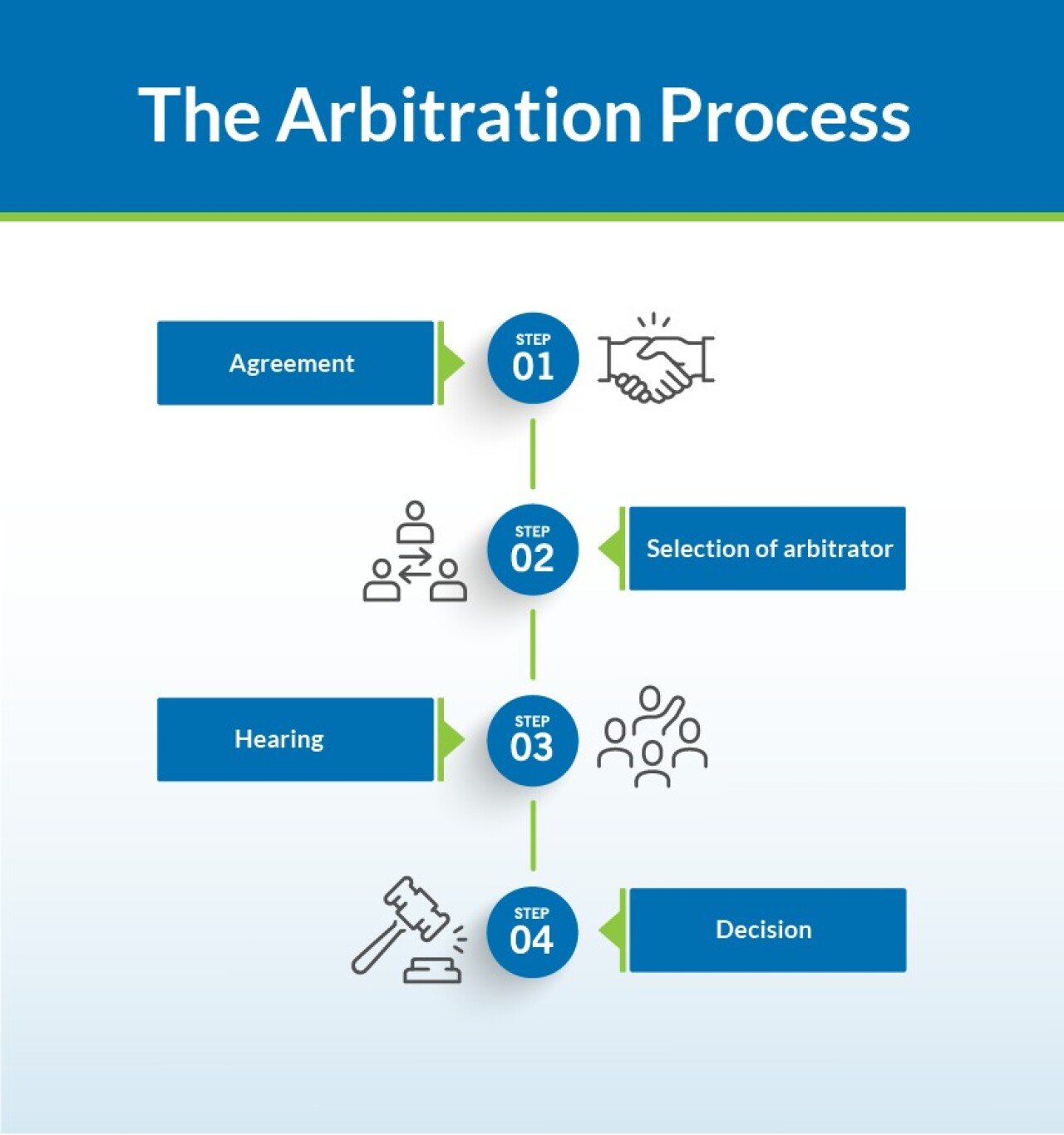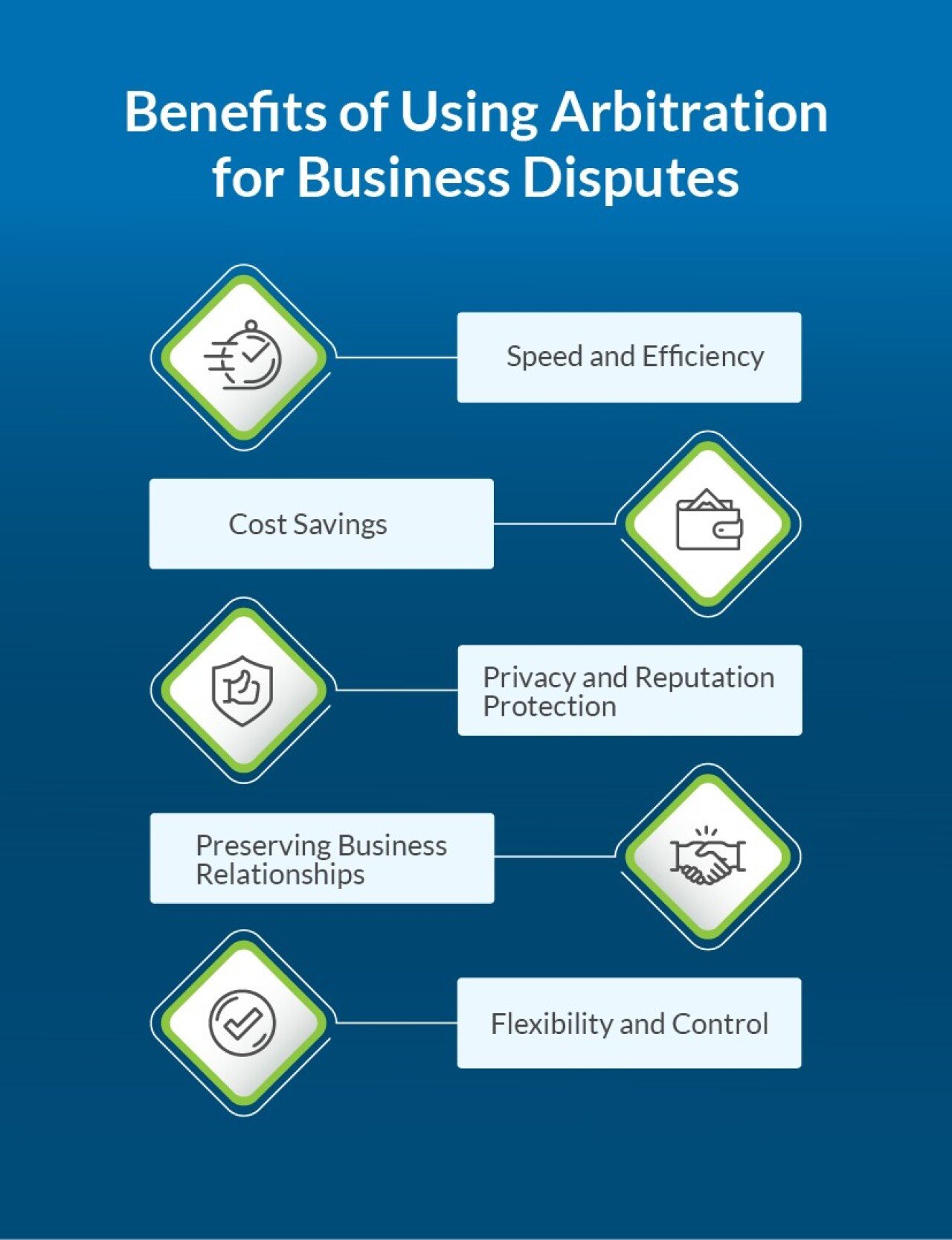Key Benefits Of Using Arbitration For Business Disputes
Business disputes often arise when companies or contractors disagree over contracts, services, or other business-related issues.

Business disputes often arise when companies or contractors disagree over contracts, services, or other business-related issues. Arbitration is a method used to resolve these disputes without going to court. In arbitration, both parties agree to have a neutral third party—called an arbitrator—listen to their arguments and make a decision.
Proper resolution ensures that businesses comply with legal obligations and avoid potential penalties. Resolving disputes amicably also helps preserve business relationships, which can be vital for future collaborations. In this post, Business Consumer Alliance explains the top benefits of using arbitration for business disputes.
What Is Arbitration?
Arbitration is an alternative dispute resolution (ADR) method that allows parties to settle legal issues outside the traditional court system. It’s a structured process where disputing parties agree to have their case decided by an arbitrator, a neutral third party.
Unlike litigation, where a judge or jury decides the outcome, arbitration allows parties to choose an arbitrator with specific expertise relevant to their industry. This is particularly beneficial for small businesses as it provides a private and efficient way to settle disputes without the high costs and lengthy timelines of court proceedings.

Arbitration generally follows these steps.
- Agreement: Both parties must agree to resolve their dispute through arbitration, which is often outlined in a contract clause.
- Selection of arbitrator: Parties select an arbitrator with relevant expertise. This can be done directly or through a “strike list,” where each party eliminates unacceptable candidates.
- Hearing: The arbitrator conducts a hearing, similar to a court trial but less formal. Both parties present evidence and arguments.
- Decision: The arbitrator issues a binding decision, known as an arbitral award, which is enforceable in court.
Imagine two companies, Alpha Tech and Beta Supplies, are in a dispute over a contract. Alpha Tech claims that Beta Supplies delivered faulty components that didn’t meet the agreed specifications. Instead of going to court, they opt for arbitration. They select an arbitrator with expertise in manufacturing and supply chain issues.
During the arbitration hearing, both companies present their evidence and arguments. The arbitrator reviews the case and decides that Beta Supplies must compensate Alpha Tech for the defective components. This decision is final and binding, allowing both companies to move forward without the prolonged process of a court trial.
Why Arbitration Is Gaining Popularity Among Business Owners
With over 13,000 B2B cases filed in 2024, arbitration is gaining popularity among business owners for several reasons, including evolving trends in dispute resolution, regulatory pressures, and the unique needs of small businesses and contractors. With the rise in commercial disputes, businesses seek efficient ways to resolve conflicts without the delays and expenses associated with court cases. Arbitration allows for a streamlined process, often resulting in quicker resolutions.
In an increasingly globalized market, arbitration provides a neutral ground for international disputes. Businesses often prefer arbitration to avoid potential biases in national courts and to ensure that decisions are enforceable across borders. The confidentiality of arbitration also protects sensitive business information from becoming public, which is crucial in maintaining a company’s reputation.
Arbitration offers a practical solution for industries like construction or moving companies, where disputes over contracts and vendor issues are common. It allows parties to appoint experts who will make informed decisions. The process is less adversarial, preserves business relationships and is flexible enough to accommodate small businesses’ specific requirements.
Top Benefits of Using Arbitration for Business Disputes
Like any legal approach, using arbitration for business disputes has its advantages. Let’s explore the top benefits.

1. Speed and Efficiency
Court cases must fit into the court’s schedule, which can be backlogged with numerous cases and lead to delays. Litigation also involves a more formal process with extensive procedural requirements, including discovery, pretrial motions, and adherence to strict rules of evidence. Furthermore, court cases often take much longer to resolve, with trials potentially scheduled years after the initial filing. Appeals can further extend this timeline.
In arbitration, parties can schedule proceedings and hearings at times that suit them, rather than being constrained by the court’s busy calendar. This flexibility allows disputes to be resolved much faster, often within months, compared to court cases that can take years to reach a trial date.
Arbitration is also less formal and involves fewer procedural requirements, which can significantly reduce the time involved. This streamlined process is particularly advantageous for some industries where time is of the essence and businesses need swift resolutions to resume operations without prolonged disruptions.
2. Cost Savings
Arbitration offers significant cost savings compared to traditional court litigation, making it an attractive option for businesses seeking to resolve disputes economically. Areas where cost-efficiency comes up include the following.
- Reduced legal fees: Arbitration typically concludes faster than court cases, which means fewer billable hours for attorneys.
- Lower administrative costs: The streamlined nature of arbitration—with fewer procedural requirements and formalities — reduces administrative expenses. This includes costs associated with preparing for hearings, as arbitration often avoids extensive pretrial motions and exhaustive discovery processes common in litigation.
- Efficiency in resolution: Arbitration’s expedited process means disputes are resolved more quickly, minimizing the indirect costs associated with prolonged legal battles, such as business disruptions and lost opportunities.
- Tailored process: Parties can tailor the arbitration process to their specific needs and potentially reduce costs further by focusing only on relevant issues and evidence, rather than adhering to the broader requirements of a court trial.
- Arbitrator fees: While parties must pay the arbitrator’s fees, these costs are often offset by the overall savings in legal and administrative expenses.
3. Privacy and Reputation Protection
Arbitration offers significant privacy and reputation protection benefits, making it an appealing choice for businesses, especially those in industries where discretion is crucial. These benefits include the following.
- Confidential proceedings: Unlike court litigation, which is public, arbitration is a private process. Only the parties involved and their legal teams hold hearings in private settings. Arbitration records are not part of the public record, ensuring that sensitive business information, such as trade secrets, financial data, and proprietary information, remains confidential.
- Protection of business reputation: Public court cases can expose companies to negative publicity, potentially harming their reputation and market position. Arbitration keeps disputes out of the public eye.
- Discretion in tight-knit industries: In industries where relationships and reputations are closely intertwined, maintaining discretion is vital. Arbitration allows companies to resolve disputes without public scrutiny, thereby preserving business relationships and industry standing.
- Control over information disclosure: Parties in arbitration can agree to keep proceedings and the final award confidential. This level of control over information disclosure is not typically available in courts where records are public.
- Legal framework for confidentiality: Some jurisdictions provide legal support for maintaining confidentiality in arbitration. This ensures that sensitive information is protected throughout the process.
4. Preserving Business Relationships
Arbitration offers a unique advantage in preserving business relationships. It is an attractive option for companies that wish to continue working together after resolving a dispute.
Businesses and contractors can preserve business relationships thanks to what the arbitration provides.
- Less adversarial processes: Unlike litigation, which is often confrontational and adversarial, arbitration is generally more collaborative. The process encourages open communication and mutual understanding, which can help maintain goodwill between parties.
- A focus on resolution: Arbitration emphasizes finding a practical solution rather than assigning blame. This focus on resolution rather than conflict can help parties move past the dispute and continue their business relationship.
- Preservation of trust: By resolving disputes in a manner that respects both parties’ interests and maintains confidentiality, arbitration can help preserve trust and respect, which are essential for ongoing business relationships.
While arbitration is beneficial for preserving relationships, it’s important to consider the nature of the dispute and the desired outcomes. In some cases, litigation may be more appropriate, especially if legal precedents need to be established or if the issues are particularly complex.
5. Flexibility and Control
Arbitration is an appealing option for businesses seeking tailored and efficient dispute resolution processes. Arbitration processes offer flexibility and control in the following ways.
- Customizable process: Unlike litigation, which follows strict procedural rules, arbitration allows parties to tailor the proceedings to their specific needs. This includes selecting the applicable law, procedural rules, timelines, and even the location and language of the arbitration. This customization can streamline the process and reduce costs.
- Choice of arbitrator: Parties can select their arbitrators to ensure that the decision-maker has the relevant expertise and experience in the specific area of law or industry involved in the dispute. This is particularly valuable in complex cases, such as those involving construction, intellectual property (IP), or international trade. For complex or high-value disputes, parties can opt for a panel of three arbitrators, providing a broader range of expertise and perspectives.
- Efficient scheduling and format: Arbitration allows for flexible scheduling of hearings and deadlines, accommodating the parties’ convenience and minimizing disruptions to their business operations. This flexibility can include taking testimony via video conference, scheduling hearings outside normal business hours, or using written witness statements to save time. Parties can decide to meet in person or virtually, or use only written submissions.
- Tailored expertise: By choosing arbitrators with specific qualifications, such as subject matter expertise or a reputation for competence, parties can ensure that the arbitration is conducted efficiently and effectively. This contrasts with court cases where judges are assigned at random, no matter their expertise in the subject matter.
Frequently Asked Questions About Arbitration
Here are more common concerns about arbitration and business disputes.
When Should a Business Use Arbitration?
Here are some scenarios where arbitration is particularly beneficial.
- Commercial and contract disputes: Arbitration is well-suited for resolving commercial disputes, including those related to contracts and project delays. Its ability to handle technical and complex issues makes it ideal for disputes that require specialized knowledge.
- B2B disputes: When conflicts arise between businesses, such as disagreements over supply contracts or service agreements, arbitration provides a less adversarial way to resolve issues while preserving business relationships.
- International trade disputes: Arbitration is favored in international trade due to its enforceability across borders — it’s recognized and binding in most jurisdictions worldwide. It is used to resolve disputes involving international sales contracts, import and export agreements, and cross-border partnerships.
- Consumer disputes: Some companies include arbitration clauses in consumer contracts to handle disputes related to product defects, service issues, or billing discrepancies. This can provide a quicker resolution than going through the court system.
- Intellectual property disputes: Arbitration can resolve disputes over IP rights, such as patent infringements or licensing agreements, allowing parties to select arbitrators with specific expertise in IP law.
When Is Arbitration Mandatory?
Arbitration becomes mandatory when parties have previously agreed to it through an arbitration clause in a contract or a separate arbitration agreement. Many commercial contracts, consumer contracts, and service agreements include arbitration clauses. These clauses specify that any disputes arising from the contract must be resolved through arbitration rather than litigation. Once parties sign a contract with such a clause, they are typically bound to resolve disputes through arbitration.
Certain industries may have regulations or standards requiring arbitration for specific disputes. For example, some financial services or securities disputes may be subject to mandatory arbitration under industry rules. In other cases, a court may order parties to arbitration if it determines that an arbitration agreement exists and is enforceable.
Are All Arbitration Decisions Final?
Arbitration decisions, also called arbitral awards, are generally final and binding, providing a level of certainty and closure that is often lacking in court litigation. Unlike court decisions, arbitration awards typically cannot be appealed. This means that once the arbitrator makes a decision, the parties must accept it, even if they believe there was an error in fact or law. This finality allows parties to move on quickly and focus on business growth without the delays associated with appeals.
While arbitration awards are final, parties might be able to challenge them on limited legal grounds, including instances of fraud, misconduct by the arbitrator or if the award violates public policy. However, these grounds are difficult to prove, making successful challenges rare.
Arbitral awards are enforceable like court judgments. Sometimes, parties may agree to an internal appeal process within the arbitration framework.
Use Arbitration to Your Company’s Benefit
Arbitration is a powerful tool for business owners and contractors to resolve disputes quickly, privately, and cost-effectively. Many small business owners lack the resources for in-house legal counsel, which is where arbitrators become valuable in many business disputes. Arbitration can help protect contractor licenses and business reputations, unlike litigation processes, which can have public consequences.
When considering arbitration providers, look for a comprehensive business support partner. Some providers offer business membership programs and consumer resources with recommendations to help protect your business.
This story was produced by Business Consumer Alliance and reviewed and distributed by Stacker.
RELATED CONTENT: How to Opt-Out of Chase’s Arbitration Clause






















